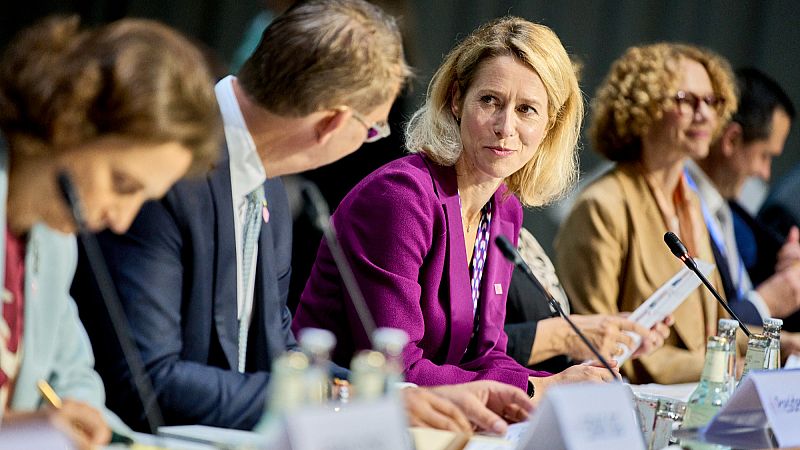'Broad support' to send European military instructors to Ukraine after a ceasefire, says Kallas

There is "broad support" among member states to extend the EU's mission to train Ukrainian soldiers to sites in the war-torn country following a ceasefire, Kaja Kallas said on Friday.
The EU's high representative told reporters after a meeting of the bloc's defence ministers in Copenhagen, Denmark, that she "welcome(s)" this broad support to extend the mandate of the EU Military Assistance Mission in support of Ukraine (EUMAM Ukraine). Some 80,000 Ukrainian soldiers have been trained in various sites across Europe by EU armed forces since it was launched in November 2022.
Changing the mandate of the mission, in which 24 EU member states and Norway participate, would require unanimity among member states.
Kallas nonetheless exposed a rift in thinking among capitals with some favouring an extension after a ceasefire or truce between Ukraine and Russia is reached, while others would rather already update the mission so that it can enter into force as soon as the two warring parties cease hostilities.
Latvian Defence Minister Andris Sprūds told reporters earlier on Friday that the Baltic nation "would be also willing to go with a training mission as a part of the Coalition of the Willing" but that first they would "have to be also clear with the parameters, the format of the ceasefire or the peace agreement".
His Estonian counterpart, Hanno Pevkur, also said they would be ready to send instructors to Ukraine, but that "first Ukrainians have to be ready for that".
"It's not only that we're sending someone. It's a huge logistical operation, it's a huge security operation. Even when the ceasefire is there, you never know when Russia will break the ceasefire," he told reporters upon arrival at the meeting earlier in the day. "Let's work together with Ukrainians. When they want us to be there, we have to be ready for that."
Kallas argued sending European military trainers to Ukraine would form one of the security guarantees the EU could provide Ukraine in the event of a truce.
Discussions over these guarantees are currently primarily taking place within the Coalition of the Willing in which some 30, mostly European countries, are working together to map out what they would be ready to provide Ukraine over the short and long term to deter any further aggression.
Kyiv views NATO and EU memberships as the ultimate security guarantees but is also calling for continued supplies of military equipment, training and intelligence data to bolster its armed forces.
European allies, led by France and the UK, are also working on establishing a "reassurance force" whereby some European troops would be deployed in no-contact areas across Ukraine.
Several countries reluctant to participate in this reassurance force have stated they would require involvement from the US to join the initiative.
Donald Trump has ruled out sending US troops on the ground but told European leaders who visited him in Washington earlier this month that he would be prepared to provide so-called backstops such as air and missile cover, and more intelligence sharing.
"Americans have been very clear Europeans have to be leading" on security guarantees, Kallas said. "So again we need to show how we are taking responsibility for certain tracks, and training has been on Europe and we are ready to do it on Ukrainian soil once there is (a) truce."
"It is also one argument to our friends who are saying that truce is important, peace is important but can only be just and lasting if there are credible security guarantees and one of the elements of credible security guarantees is the EU training, the military mission as well as the civilian mission," she added.
Ministers gathered in the Danish capital also discussed how to bolster Ukraine's defence and to close the EU's military capability gaps.
The EU has identified nine priority areas for defence investments including air defence and drones and put forward a €150 billion loan scheme to jointly procure some of the equipment faster and at lower cost.
Member states are aiming to define which of them should take the role of "lead nation" for each of these priority areas and negotiate contracts by the end of October.
Today

